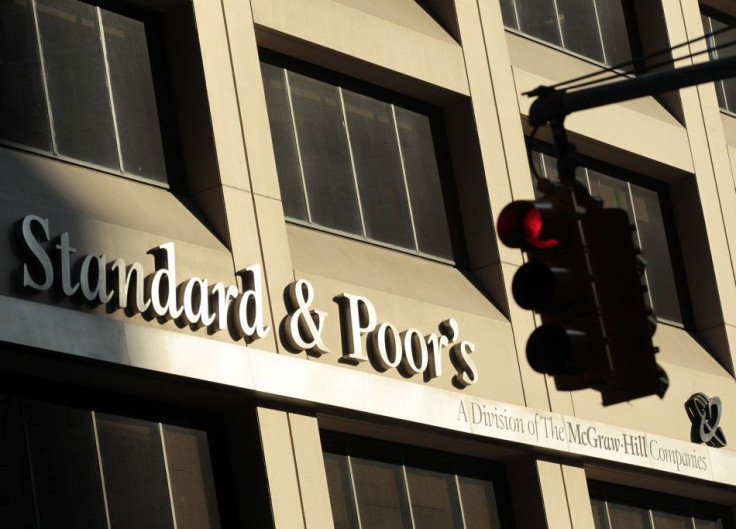S&P Downgrades U.S. Credit Rating; What Lies Ahead?

The U.S. lost its AAA credit rating from Standard and Poor's for the first time in history, dealing a symbolic blow to the world's economic superpower. The decision by S&P to downgrade U.S. credit rating to AA plus, puts the nation in the same category such as Japan, China, Spain, Taiwan and Slovenia.
The firm added that the outlook on the new U.S. credit rating is "negative" - a sign that another downgrade is possible in the next 12 to 18 months.
S&P's decision came after fierce wrangling in Congress over spending cuts and raising taxes to reduce the nation's debt and allowing the debt ceiling to be lifted. President Obama signed a legislation on Tuesday that's designed to reduce fiscal deficit by $2.1 trillion over 10 years. However, this fell short of the $4 trillion in savings that S&P had called for as "down payment" on fixing America's finances.
"The fiscal consolidation plan that Congress and the Obama administration agreed to this week falls short of the amount that we believe is necessary to stabilize the general government debt burden by the middle of the decade," an S&P spokesperson said.
S&P stripped America of its top rating over concerns about the nation's growing debt, the budget deficits as well as the stalemate in the Congress that put the U.S. on the brink of default.
In a rather scathing critique of the government's ability to handle public finances, S&P announced that "The political brinkmanship of recent months highlights what we see as America's governance and policymaking becoming less stable, less effective and less predictable than what we previously believed.
The statutory debt ceiling and the threat of default have become political bargaining chips in the debate over fiscal policy."
The downgrade to AA+ could result in a major upheaval in the global financial markets, which suffered a volatile week spurred on by concerns over a worsening debt crisis in Europe and a faltering U.S economy.
The downgrade could eventually increase borrowing costs for the U.S. government because its bonds would be considered more risky. The higher interest rates the U.S. Treasury might have to charge for its bonds could impact other areas, such as mortgages. U.S. Treasury bonds, once seen as the world's safest, are now rated lower than bonds issued by countries like Britain, Germany and France.
A downgrade could also have a cascading series of effects on states and localities, including nearly all of those in the Washington, D.C. metro area. These governments could lose their AAA credit ratings as well, potentially raising the cost of borrowing for schools, roads and parks, states a Washington Post report.
Moreover, S&P's move is likely to worry foreign creditors especially China, which holds more than $1 trillion of U.S. debt.
"The days when the debt-ridden Uncle Sam could leisurely squander unlimited overseas borrowing appeared to be numbered" and S&P was "telling the global investors the ugly truth," Xinhua News Agency said in a commentary today. The U.S. needs to address its debt problems and protect China's dollar assets, added the commentary.
China's foreign minister Yang Jiechi told Polish media that the threat of a U.S. sovereign debt is increasing and that he hoped that the U.S. will conduct a "responsible" monetary policy and guarantee the security of other countries' U.S. assets.
However the repercussions of the downgrade may not be very foreboding for the U.S. Two other leading credit rating agencies, Moody's Investors Service and Fitch Ratings, decided this week to keep their AAA rating for U.S. debt for now. Moreover, Treasury bonds are still considered a safe haven, particularly in stressful financial conditions.
"We expect some further pressure on the U.S. dollar, but a sharp sell-off is in our view unlikely," said Vassili Serebriakov, of Wells Fargo in New York, according to a Daily Mail report. "One of the reasons we don't really think foreign investors will start selling U.S. Treasuries aggressively is because there are still few alternatives to the U.S. Treasury market in terms of depth and liquidity."
Analysts say the initial effect on the markets could be modest because they have been anticipating an S&P downgrade for weeks. The exact impact of the downgrade could take even longer to assess.
The decision to downgrade came after an intense battle between the Obama administration and S&P. Treasury Department officials argued that the firm's analysis was flawed as it had made a numerical error in a draft of its downgrade report that overstated the deficit over 10 years by $2 trillion. However S&P disputed the Treasury's claim saying that it had lowered its estimate of discretionary spending by $345 billion after discussions with the Treasury, and that the change didn't affect its decision to lower the credit rating.
The fact that S&P was one of the credit rating agencies that gave AAA ratings to mortgage backed securities that brought about the financial crisis, raises questions about the credibility of this agency to downgrade the U.S. credit ratings.
Time will reveal how much or how little the impact of the downgrade will have on the U.S. Political parties, especially the Republicans, need to stop the blame game and start focusing on how to resolve the crisis. S&P's decision should incite the U.S. Congress to come up with a comprehensive plan to redress the nation's debt debacle.
© Copyright IBTimes 2025. All rights reserved.





















